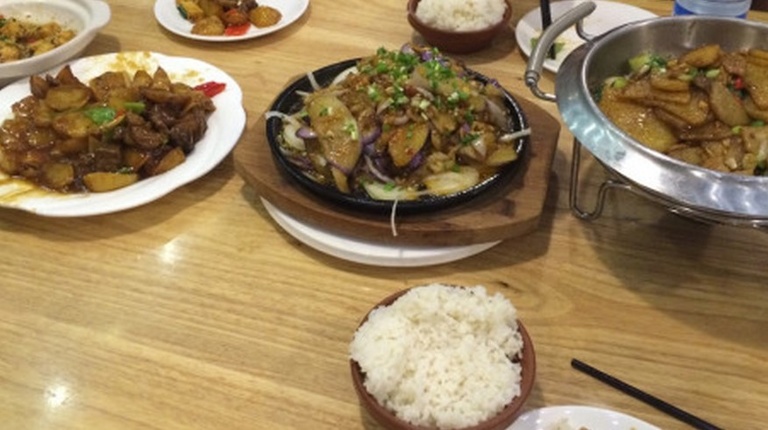Carolyn Hoemann is a University of Iowa sophomore studying ethics and public policy with a certificate in fundraising and philanthropy communication. She will be spending this academic year abroad in Shanghai, China, on the USAC Yearlong Program in China. Read on for some of Carolyn's initial reactions upon arriving in China and on tackling the language barrier:
By Carolyn Hoemann

Even if we don't know how to pronounce all of the foods, Chinese cuisine is still amazing.
Many students at the University of Iowa are interested in studying abroad to seek business internships, learn about other cultures or try great food. Similarly, there were many reasons that influenced my decision to study in Shanghai.
I think the culture and politics are interesting, especially as they evolve with China’s international presence. But my most significant draw to China is the intricacy and beauty of Mandarin. The Chinese language has a history as rich as the nation. Centuries of philosophical and practical evolution have created modern Mandarin, a language spoken by roughly one of every five people in the world. Chinese also has deep artistic value that is wonderfully displayed in traditional calligraphy and poetry. I have studied Mandarin for a little while but between my embarrassment and narrow vocabulary I am fairly uncomfortable conversing with native speakers.
Most of the other students in my program are at the same level of language ability. This was comforting at first – it’s easy to be intimidated by a classmate’s mastery of something you struggle with. But the first time some of the American students and I tried to order dinner I realized our lack of fluency wasn’t so good. Between the four of us, we only knew the words for spicy, rice and beer. Sure, that was enough to get some good food, but our gestures and loud laughing drew a lot of attention from the locals stopping by their regular lunch spot.
As a couple of weeks have gone by, I now feel more comfortable ordering food, but other things are not yet so easy. Cab rides can frustrate the driver and the passengers. The grocery store is still a war against the language barrier. Actually, at the three-story mega-mart by campus, the term “language barrier” doesn’t do the situation justice. Moreso, it is a language brick wall. A blockade, if you will. Even if I know how to ask what something is, I don’t usually understand the response. However, even with my glowing foreignness and broken Chinese, it seems that most locals are willing to work with me. It’s always striking that local people seem to enjoy (or at least find humor in) helping me communicate. Even with the few sour experiences I’ve had trying to get around, Chinese people are overwhelmingly welcoming and friendly to us foreigners.
The generosity that I’ve walked into in China is very different from the experiences many foreigners have in America. At home, we have pretty high demands of people who just move to our country or who are learning English as a second language. Where China has English on most public transportation signs, menus and other materials to help foreigners access the city, there is significant pushback against using Spanish more frequently in America even though millions of citizens speak it as a first or second language. Interpersonally, it’s very difficult for foreigners to communicate with Americans if their English isn’t spot-on. And even when someone is speaking correctly, if their accent is deemed too thick or too weird, Americans often disregard the effort. As I make a mockery of Mandarin while being celebrated by locals for attempting to communicate, I can’t imagine what it would be like to try so hard and be met with barriers beyond just the language.